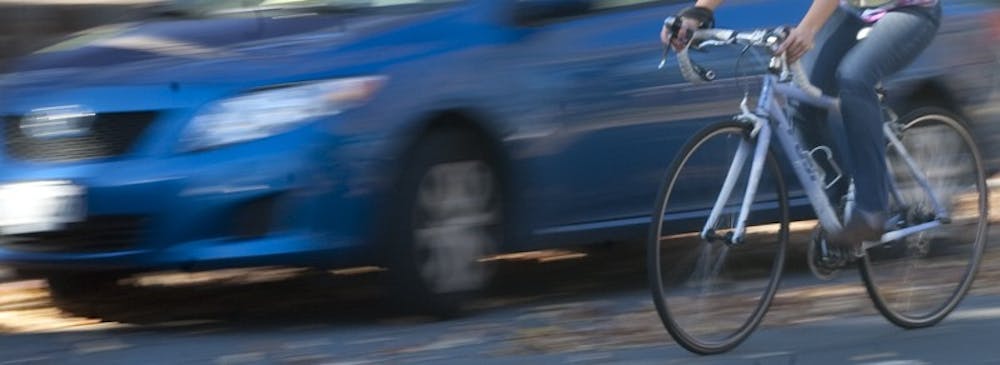In late April, graduate student Matthew King collided with a Charlottesville utility truck at the intersection of West Main Street and Fourth Street Northwest while riding his bicycle along West Main Street. King, who was wearing a helmet, was pronounced dead at the University Medical Center shortly after the accident.
Early Tuesday morning, a SafeRide van was making a left onto Alderman Road from McCormick Road when it collided with a biker traveling on McCormick Road. The biker, first-year College student Patrick Monk, underwent surgery to repair a broken ankle, and suffered a torn calf muscle and bruised bone in his right leg. Charges against the driver, who is a University Police officer, are pending an investigation by the Virginia State Police.
For those who travel on two wheels, safety on the streets seemingly has become more of an issue and has drawn the attention of local officials and community members.\nIn September, a survey of 586 local cyclists revealed overwhelming support for more on-road bike lanes, specifically along Ivy Road and West Main Street, where King's collision took place.
The results were discussed during a summit organized by Bike Charlottesville and the Alliance for Community Choice in Transportation. Local government and University officials spoke at the event.
Although Charlottesville allocates $50,000 in its 2011 fiscal year capital improvement budget toward bicycle infrastructure, funding to create bike lanes and improve bike safety remains difficult to obtain. Albemarle County Supervisor Dennis Rooker cited a $5.7 million drop in transportation funding during the past five years.
"Our primary challenge is that we have an already-built city, and in order to create more bike lanes, we would need to take more cars off the road," said Ric Barrick, director of communications for the City of Charlottesville.
Still, given that the University community overlaps with that of the city, many bicyclists are students or employees at the school.
"Most bicycle infractions deal with U.Va. students and faculty, which is why we're working on ways to partner with the school," Barrick said.
During an Oct. 20 community discussion about bike safety, the Shenandoah Valley Bicycle Coalition showed members of the Charlottesville City Council video clips from their trip to Davis, Calif., which is known as one of the more bicycle-friendly communities in the United States. The group described how Davis changed traffic lanes and patterns to create "cycling boulevards," accommodating both motorists and cyclists.
Davis first implemented its bike system during the 1960s, Heather Higgins of Bike Charlottesville said, and while groups see Davis as the gold standard for bike safety, they understand that they are faced with challenges to update infrastructure for cyclists.
"What we're looking to do is to bring about a community that is more interconnected, safer for all vulnerable users of the roadways and provides safer, more vibrant streets and communities," Higgins said at the meeting.
Higgins' group has suggested new regulations that would improve safety without the added infrastructure of bike lanes. One proposal would allow law enforcement officials to sanction drivers who speed past cyclists in an unsafe manner, without having to penalize them with a severe reckless driving charge. The group also wishes to increase the legal distance for drivers to pass bikers, which is currently two feet.
While the Charlottesville community is working to rein in unsafe behavior from drivers, students recognize that some of the responsibility lies with the bikers themselves.
"I think people do need to be more aware of the dangers of biking in the dark. It just doesn't occur to them," said biker and third-year College student Reedy Swanson.
The city has started operation "Share the Road," where police officers will patrol West Main Street, sanctioning bicyclists and motorists who do not obey traffic laws.
The community of local cyclists sees Charlottesville's efforts as an occasion to bolster more options for reliable transportation.
"This is an opportunity to look fresh at where cyclist travel and accommodate them as well as motorists," Higgins said.







